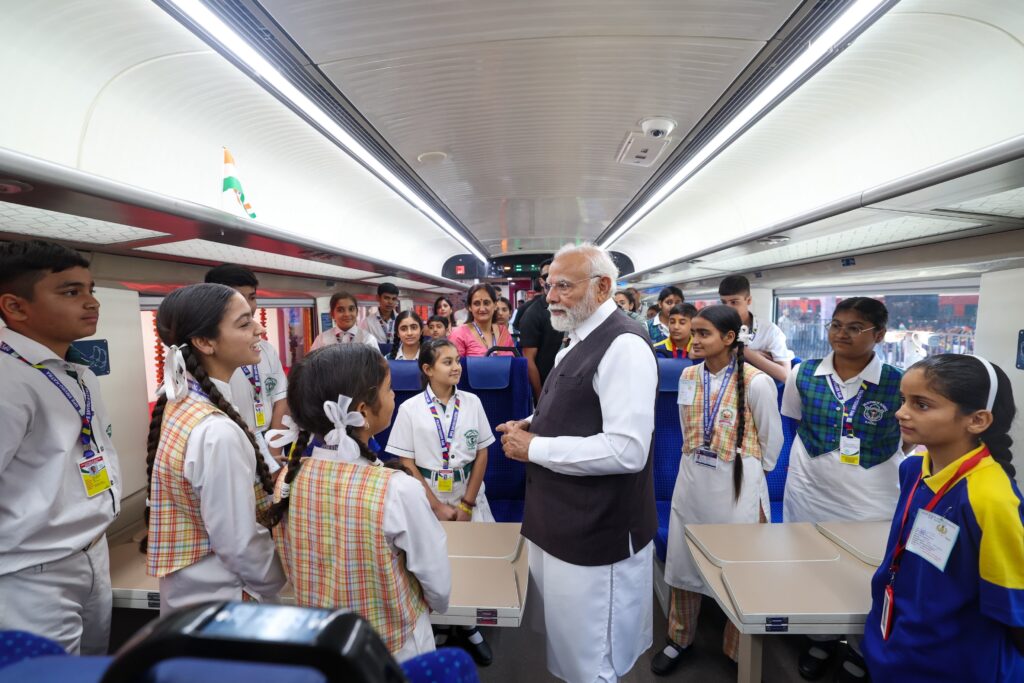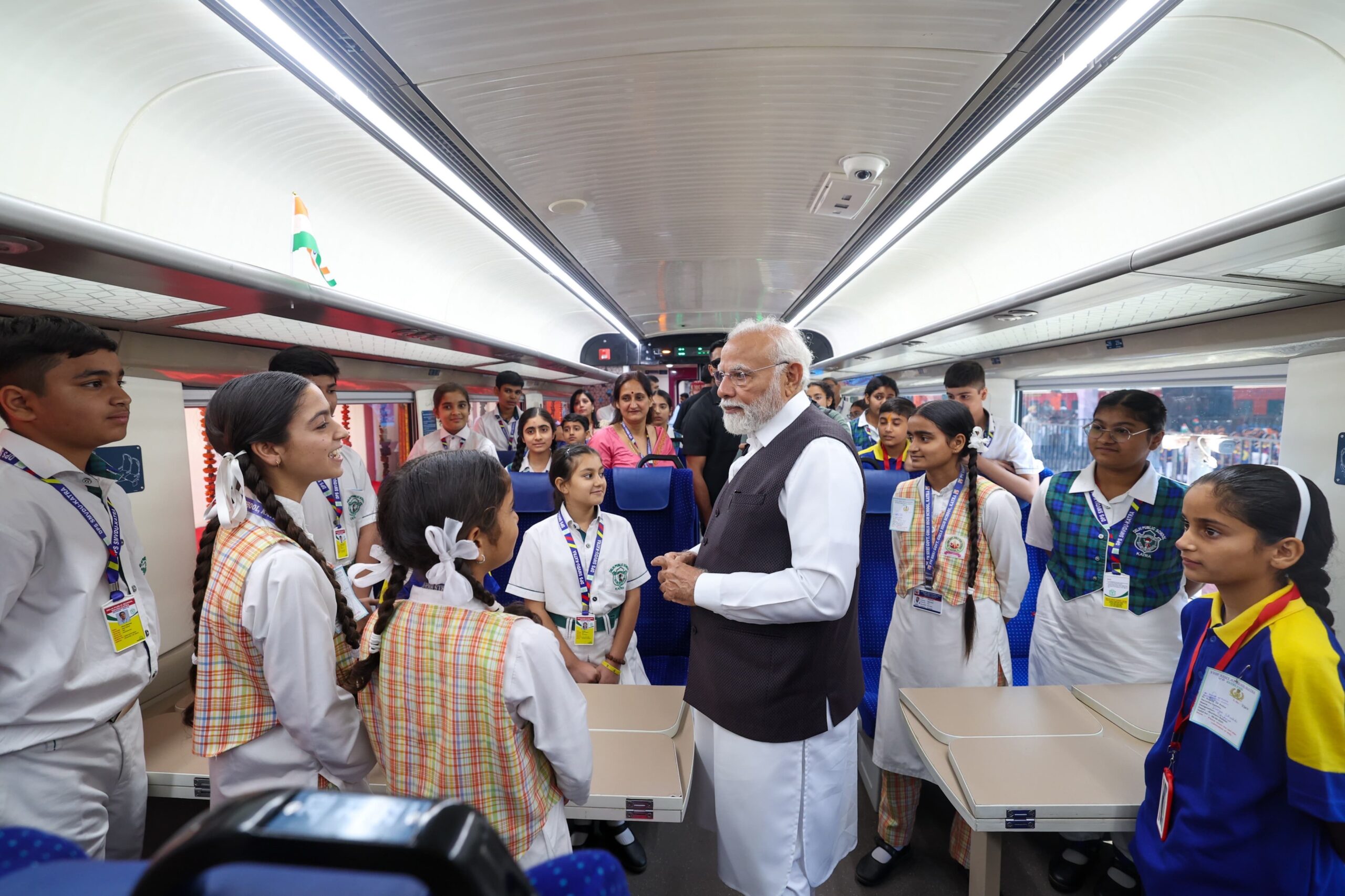By Ajaz Rashid
For ordinary Kashmiris, the railway is a lifeline that transcends transportation. Jibran, a Srinagar resident, shared how the train offers safer, more affordable travel for families who once relied on costly flights or feared the unpredictability of highway closures during harsh winters. “This train has brought safety, affordability, and convenience. It feels like a new chapter of connectedness for all of us,” he said.
Students, patients, and traders from remote districts like Kupwara welcome the rail link as a vital bridge to better education, healthcare, and economic opportunities. Abdul Qayoom, a teacher from Kupwara, remarked, “Our people will now have better access to cities, bringing us closer to the rest of India.”

Nazakat Saleem, a local woman, emphasized the practical benefits: “During winters, roads close, and many cannot afford air travel. This train is the best transport option for us.”
For many Kashmiris, the rail link is the fulfillment of a dream decades in the making. Peer Jalaludin, former mayor of Baramulla, watched the inaugural journey with pride and nostalgia. He recounted how his father, a legislator in the 1960s, first raised the demand for rail connectivity—once deemed impossible. “This is a watershed moment not just for Kashmir but for the entire region,” he said.
Kashmir’s renowned fruit growers are among the most enthusiastic supporters. Mohammad Yaseen Khan, Chairman of the Kashmir Economic Alliance, described the new rail service as a “much-needed boost” to the economy, allowing apples, cherries, and other produce to reach markets faster and fresher. This promises to reduce losses and increase profits for thousands of families.
Bashir Ahmad Basheer, head of the Kashmir Valley Fruit Growers and Dealers Union, called the railway “more than infrastructure; it is a bridge of opportunity,” easing road congestion, lowering costs, and increasing competitiveness.
Artisans see new hope too. Ghulam Rasool, a master craftsman, believes improved connectivity will open national and international markets for Kashmiri handicrafts, rejuvenating a sector central to the Valley’s heritage.
Tourism stakeholders anticipate a surge in visitors. Houseboat owners in Srinagar and hotel operators in Anantnag expect increased bookings, with tourists able to reach Kashmir faster and more comfortably. A Srinagar houseboat owner said, “Vande Bharat Express will breathe new life into our struggling tourism industry.”
Pilgrimage businesses in Katra are equally optimistic. Sunita Devi, who runs a small eatery near Vaishno Devi, said, “Pilgrims can now extend their visit to Kashmir, boosting local business.”
The launch has drawn praise across party lines, reflecting its broad symbolic importance. Former chief ministers Mehbooba Mufti and Omar Abdullah called it “a landmark day.” Opposition leader Sunil Sharma called the project “revolutionary” for regional connectivity, while Apni Party president Syed Altaf Bukhari hailed it as “the fulfillment of a long-cherished dream.”
Javed Tenga, president of the Kashmir Chamber of Commerce and Industries, highlighted the train as a catalyst for tourism and trade growth, facilitating visitor travel and smoother goods movement.
Indian Railways officials cited the inaugural freight shipment of 24 tonnes of cherries from Kashmir to Mumbai in 33 hours—compared to nearly a week by road—demonstrating huge efficiency gains expected to reduce costs by 75% and boost farmers’ incomes.
Appreciation comes from beyond Kashmir. Delhi author Satesh Verma called the rail link “a game changer for the economy of Jammu and Kashmir, especially the Valley,” creating new economic corridors.
Businessman Anand Dev from Uttar Pradesh praised the journey’s speed and comfort, hoping it enhances tourism and ties.
Raj Kumar, a sarpanch from Jammu’s Reasi district, said the train will “bridge not only distances but hearts between Jammu and Kashmir.”
Spanning 272 kilometers, with 36 tunnels and 943 bridges, the new rail link is a remarkable engineering feat and a potent symbol of inclusion and progress. Passengers on the inaugural train said, “We’re witnessing history.”
For Kashmiris and the nation alike, the railway is more than tracks and steel—it is a promise of opportunity, unity, and a brighter future.
While celebrating the milestone, stakeholders urge the government to expand services with direct trains to major metros like Delhi and dedicated goods trains, further enhancing economic benefits and connectivity.
As one local summed up, “This train is our messiah. It has changed our destiny and opened doors to new opportunities.”
